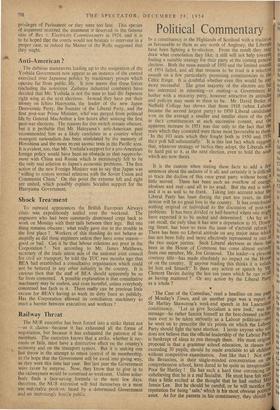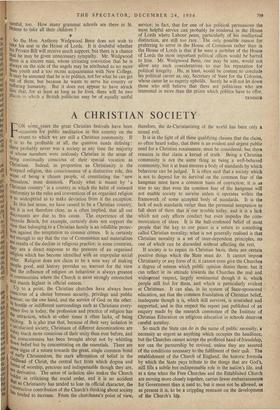Political Commentary
iN a constituency in the. Highlands of Scotland with a tradition as favourable to them as any north of Anglesey, the Liberals to have been fighting a by-election. From the result they may hi draw what consolation they like; it still will not help towards ti• finding a suitable strategy for their party at the coming general election. Both the mass assault of 1950 and the limited assault al of 1951 failed, and all that remains to be tried is a selective a assault on a few particularly promising constituencies in the It Celtic fringe. it is doubtful whether even this would be anY 01 more successful. The great majority of the electors are far si too interested in returning—or ousting—a Government to hi bother with a minority party, however attractive its attitudes pl and policies may seem to them to be. Mr. David Butler of Nuffield College has shown that from 1918 (when Labour became the second largest party) to 1950 Liberal candidates won on the average a smaller and smaller share of the poll in their constituencies at each successive contest, and the apparent increase in 1951 was due only to the fact that the seats which they contested were those most favourable to that ' In the 103 seats which they fought both in 1950 and 1951 their poll fell substantially.' It is this last fact which suggests that, whatever strategy or tactics they adopt, the Liberals vall be hard put to it, at the next election, even to hold the seats which are now theirs.
It is the custom when stating these facts to add a leg' sentences about the sadness of it all, and certainly it is difficult to trace the decline of this once great party without being 3 4,e little moved. There has been such an overflow of energy' idealism and zeal—and all to no avail. But the end is near, Cl and it is as well to be frank. Taking into account what the, e(1 Liberal Party has been during the past ten years, its final, is demise will be no great loss to the country. It has contributed nothing original or individual to the discussion of post-War problems. It has been divided or half-hearted where one inight have expected it to be united and determined. (As far as I can recall, the only time it has sent a deputation to 10, Down' tug Street, has been to raise the issue of eIectoral reform There has been no Liberal attitude on any major issue which, has not been fully and more effectively represented in one 01 the two major parties. Such Liberal alertness as there has been in the House of Commons has come almost entirelY from one member, Mr. Joe Grimond. The leader—a pleasing courtesy title—has made absolutely no impact on the House or on the country. If anyone reading this thinks it is unfair, let him ask himself :' Is there any action or speech by Nit,; Clement Davies during the last ten years which he can recall as having mattered 7 Or any action by the Liberal PartY as a whole ?
I * The Case of the Comedian,' read a headline on one pal _° of Monday's Times, and on another page was a report a 'lc Sir. Hartley Shawcross's week-end speech in his Lancashire In constituency. Let us give Socialism a new look,' was his Wl message—he rather fancies himself as the best-dressed yachts", th, man ever to be taken seriously as a Labour politician—and ex he went on to prescribe the six points on which the Labo!'t Party should fight the next election. I invite anyone who 01' does not believe that the official leadership of the Labour Parry is bankrupt of ideas to run through them. His most origin Careful, too. How many grammar schools are there in St. Helens to take all their children ?
So the Hon. Anthony Wedgwood Benn does not wish to take his seat in the House of Lords. It is doubtful whether his Private Bill will receive much support, but there is a chance that he may be given unnecessary sympathy. Mr. Wedgwood terin is a sincere man, whose irritating conviction that he is always on the side of the angels may be attributed to no more than youth and a too recent acquaintance with New College. It may be assumed that he is in politics, not for what he can get out of them, but because he wants to serve his country or !Offering humanity. But it does not appear to have struck dint that.. for at least as long as he lives, there will be two Places in which a British politician may be of equally useful service; in fact, that for one of his political persuasions the most helpful service can probably be rendered in the House of Lords where Labour peers, particularly of his intellectual distinction, are still too rare. The only possible reason for preferring to serve in the House of Commons rather than in the House of Lords is that if he were a metnber of the House of Lords the most important political offices would be barred to him. Mr. Wedgwood Benn, one may be sure, would not allow any such considerations, to mar his reputation for political integrity. He, at least, would be content to conclude his political career as, say, Secretary of State for the Colonies, whose cause he so eagerly upholds. Surely he will not let down those who still believe that there are politicians who are interested in more than the prizes which politics have to offer.
TRIMMER



























 Previous page
Previous page